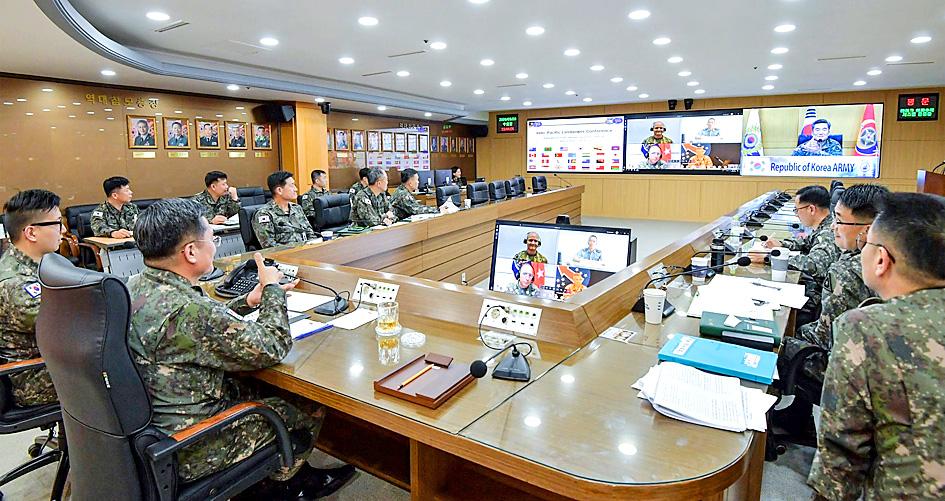Just hours after President Tsai Ing-wen’s (蔡英文) inauguration on Wednesday, the US Department of State’s Defense Security Cooperation Agency announced in Washington the possible sale of 18 MK-48 Heavy Weight Torpedoes to Taiwan.
Reacting to the announcement, Minister of Foreign Affairs Joseph Wu (吳釗燮) yesterday told a meeting of the Legislative Yuan’s Foreign Affairs and National Defense Committee that the ministry applauded the US move, which would help to uphold the Taiwan Relations Act (TRA).
The TRA states that the US should “provide Taiwan with arms of a defensive character … to maintain the capacity of the US to resist any resort to force or other forms of coercion that would jeopardize the security, or the social or economic system, of the people on Taiwan.”

Photo: screen grab from Facebook
The possible sale — which includes 18 MK-48s, spare parts, logistics support, training and manuals — was valued at US$180 million and is pending review by the US Congress.
Wu told Democratic Progressive Party (DPP) Legislator Lo Chih-cheng (羅致政) that the announcement could be considered tacit US support for the Taiwan’s indigenous arms manufacturing program.
Deputy Minister of National Defense Chang Che-ping (張哲平) said in an interview at the Legislative Yuan that the sale, if approved, would help strengthen the nation’s defensive capabilities and maintain peace in the region.
However, in Beijing, Chinese Ministry of Foreign Affairs spokesman Zhao Lijian (趙立堅) yesterday said that China is “staunchly against” US arm sales to Taiwan, reminding the US to observe the “one China” principle and to respect the three US-China communiques on the issue.
China’s state-run Global Times said that Beijing should “zero Taiwan’s diplomatic relations,” as the basis of regular US-China interaction over the “Taiwan issue” had been undermined and Beijing should pursue its goals in its own fashion.
The Ministry of Foreign Affairs in Taipei declined to comment on the article.
In related news, the military on Wednesday and yesterday participated in the US-led Indo-Pacific Landpower Conference, which was held by videoconference.
Footage released by the South Korean Army showed that the Republic of China national flag had been included alongside those of the other 26 participating nations.
Taiwan was represented by Army Logistics Command Combat Medic Division Major General Hsieh Chung-bao (謝宗保).
Meanwhile, responding to DPP Legislator Chao Tian-lin’s (趙天麟) query about a possible visit by a delegation headed by Czech Senate President Milos Vystrcil, Wu said that the the government would welcome such a visit.
The foreign ministry would make the necessary preparations once the global COVID-19 pandemic has been brought under control, he said.
Additional reporting by Aaron Tu and Lu Yi-hsuan

CHAOS: Iranians took to the streets playing celebratory music after reports of Khamenei’s death on Saturday, while mourners also gathered in Tehran yesterday Iranian Supreme Leader Ayatollah Ali Khamenei was killed in a major attack on Iran launched by Israel and the US, throwing the future of the Islamic republic into doubt and raising the risk of regional instability. Iranian state television and the state-run IRNA news agency announced the 86-year-old’s death early yesterday. US President Donald Trump said it gave Iranians their “greatest chance” to “take back” their country. The announcements came after a joint US and Israeli aerial bombardment that targeted Iranian military and governmental sites. Trump said the “heavy and pinpoint bombing” would continue through the week or as long

TRUST: The KMT said it respected the US’ timing and considerations, and hoped it would continue to honor its commitments to helping Taiwan bolster its defenses and deterrence US President Donald Trump is delaying a multibillion-dollar arms sale to Taiwan to ensure his visit to Beijing is successful, a New York Times report said. The weapons sales package has stalled in the US Department of State, the report said, citing US officials it did not identify. The White House has told agencies not to push forward ahead of Trump’s meeting with Chinese President Xi Jinping (習近平), it said. The two last month held a phone call to discuss trade and geopolitical flashpoints ahead of the summit. Xi raised the Taiwan issue and urged the US to handle arms sales to

BIG SPENDERS: Foreign investors bought the most Taiwan equities since 2005, signaling confidence that an AI boom would continue to benefit chipmakers Taiwan Semiconductor Manufacturing Co’s (TSMC, 台積電) market capitalization swelled to US$2 trillion for the first time following a 4.25 percent rally in its American depositary receipts (ADR) overnight, putting the world’s biggest contract chipmaker sixth on the list of the world’s biggest companies by market capitalization, just behind Amazon.com Inc. The site CompaniesMarketcap.com ranked TSMC ahead of Saudi Aramco and Meta Platforms Inc. The Taiwanese company’s ADRs on Tuesday surged to US$385.75 on the New York Stock Exchange, as strong demand for artificial intelligence (AI) applications led to chip supply constraints and boost revenue growth to record-breaking levels. Each TSMC ADR represents

Pro-democracy media tycoon Jimmy Lai’s (黎智英) fraud conviction and prison sentence were yesterday overturned by a Hong Kong court, in a surprise legal decision that comes soon after Lai was jailed for 20 years on a separate national security charge. Judges Jeremy Poon (潘兆初), Anthea Pang (彭寶琴) and Derek Pang (彭偉昌) said in the judgement that they allowed the appeal from Lai, and another defendant in the case, to proceed, as a lower court judge had “erred.” “The Court of Appeal gave them leave to appeal against their conviction, allowed their appeals, quashed the convictions and set aside the sentences,” the judges